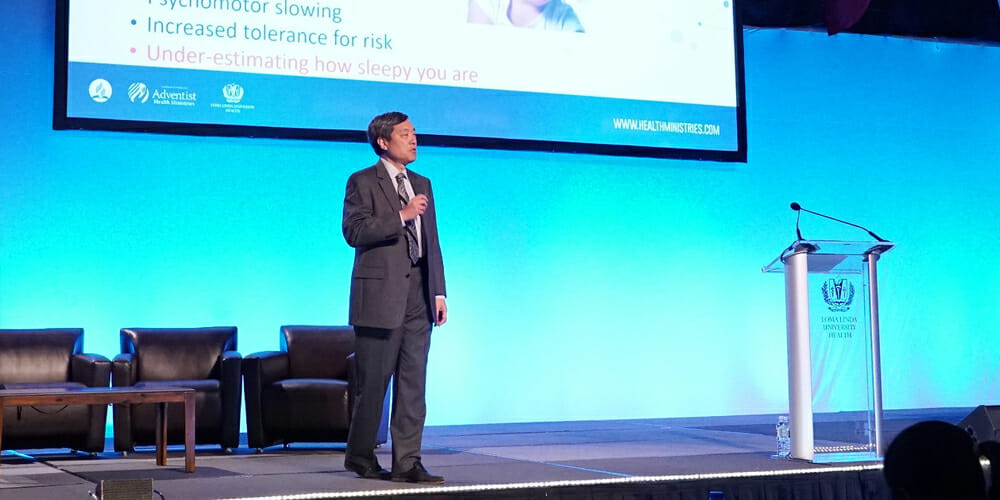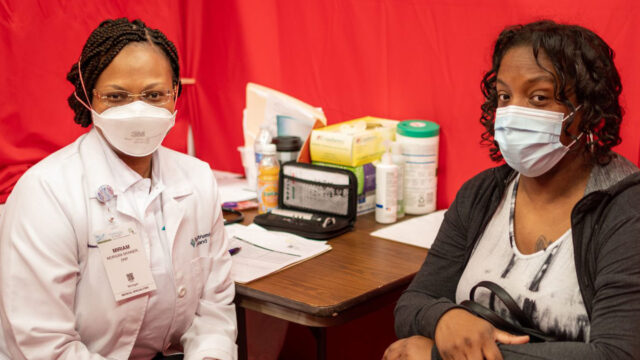“Sleep is a gift from God,” said expert Daniel Giang at the 3rd global health conference.

At the 3rd Global Health and Lifestyle Conference in Loma Linda, California, United States, held July 9-13, 2019, plenary speaker Daniel Giang said that many Seventh-day Adventists are telling themselves that “it’s OK not to sleep.”
“We tend to associate sleep with not being energized or on fire with the work God wants us to do,” he said.
Speaking to the approximately 800 health-care professionals and health ministry advocates from some 90 countries in attendance at the event, Giang said it’s not uncommon for Adventists to ask, “Why are we wasting a third of our life with sleep? If I’m a good manager or administrator, I should be awake at night wrestling with challenges.”
“But sleep is not the problem,” he said. “Sleep is a gift from God.”
Giang, vice president of Graduate Medical Education for Loma Linda University Health, explained that natural sleep is essential to physical, psychological, social, and spiritual health, no matter the person’s age.
“Sleep deprivation can have harmful long-term results,” he said. “Symptoms include poor learning, inattention, and poor judgment. You’re more likely to push ‘Send’ on an unwise e-mail or make imprudent decisions.”
Sleep Deprivation
Sleep deprivation can also result in burnout, worsened depression and anxiety, less resilience, and a lack of a sense of wellness, Giang said.
“More and more studies appear to suggest that people with poor sleep have a higher incidence of Alzheimer’s and dementia in later years,” he said. “And then there’s obstructive sleep apnea.”

Sleep apnea happens when breathing repeatedly stops and starts during sleep, and the person may abruptly awake gasping. It is usually accompanied by loud snoring and excessive daytime sleepiness.
“I’ve heard people say, ‘No one has ever died from snoring,’ but I know of at least two prominent cases where they did,” Giang said. He cited the deaths of U.S. Supreme Court Justice Antonin Scalia and movie actress Carrie Fisher. “It’s believed that sleep apnea played a role in both their deaths,” he said.
Natural Sleep Cycles
Giang explained that “just being unconscious” does not mean your brain is benefitting from restorative sleep. He strongly advised against using any form of sleep aids, because the result is not a natural sleep. When we sleep naturally, he said, our brains run through a series of stages, including dream sleep — which is rapid-eye-movement, or REM, sleep. Each of these cycles is completed in 90 minutes. Unless your brain cycles through these stages, Giang said, you will not feel rested when you awaken.
Most adults, he said, get their best quality sleep earlier at night. Those in their late teen years and young adults generally do best going to sleep and awakening later.
“When a college class is scheduled for seven in the morning, whose sleep schedule does that best fit?” Giang asked. “The professor’s — not the students’,” he said.
Bedtime Routines
To aid good sleep, make the bedroom a pleasant place, Giang noted. It should be well-ventilated, quiet, and dark. The bed and room temperature should be comfortable. “Schedule worry” for another time, he said. Also establish a regular time to go to bed and to rise in the morning.
“Your bedtime routine should be to think of three things you’re grateful for and thank God for them, and turn your problems over to God,” he said. “Contemplate God’s wonderfulness, and you will sleep better, feel better, and be a more effective leader in God’s vineyard.”








